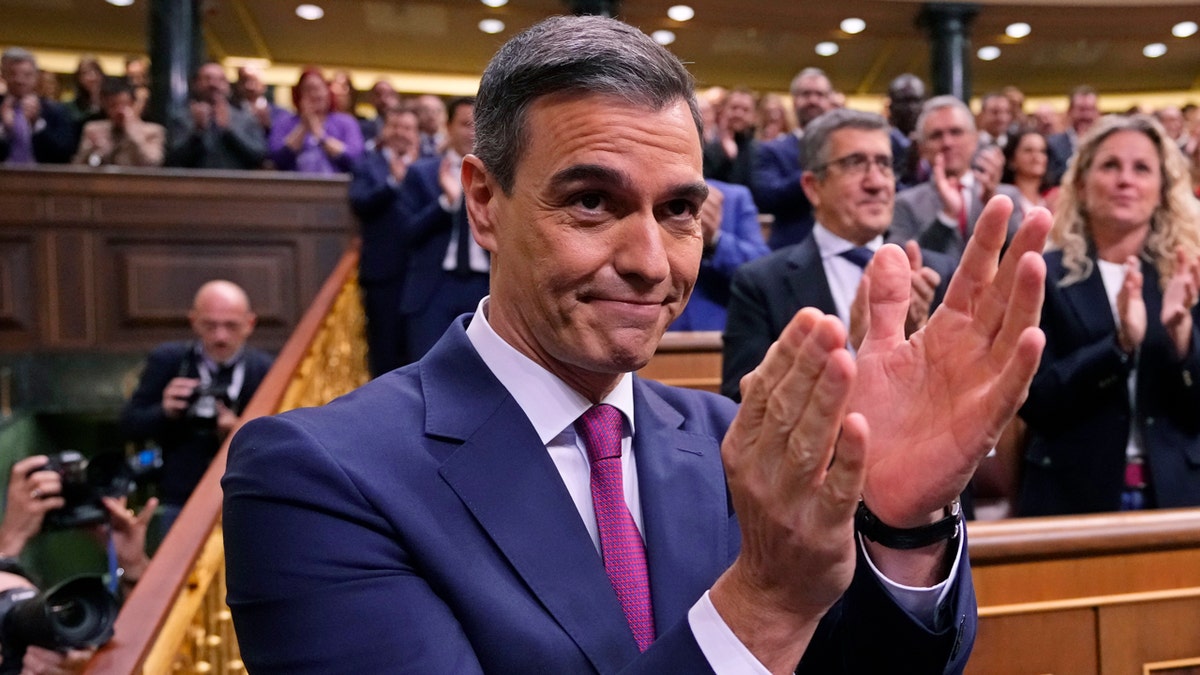INTERNACIONAL
Spain’s Sánchez defends controversial amnesty deal brokered with Catalan separatists

Spain’s acting Prime Minister Pedro Sánchez on Wednesday defended his controversial amnesty deal for Catalonia’s separatists in parliament a day before the Socialist leader seeks the endorsement of the chamber to form a new government.
Sánchez has the support of six smaller parties to ensure that he can reach the absolute majority of 176 deputies needed to reestablish his minority coalition government with the left-wing Sumar (Joining Forces) party.
The formation of a new government would end a period of political uncertainty since inconclusive national elections on July 23 left a highly fractured parliament. The center-right Popular Party received the most votes in the elections, but it failed to get enough support to form a government in September because of its alliances with the far-right Vox party.
ACTING SPANISH PM GETS SECOND CHANCE AT POWER AS CONSERVATIVES STRUGGLE TO SET UP NEW GOVERNMENT
The Socialists finished second in the elections with 121 seats in the 350-seat Parliament but now have the support of 179 lawmakers in all.
Controversy has erupted over deals Sánchez’s Socialists signed with two key Catalan separatist parties. Those include a commitment to pass an amnesty law that would wipe the slate clean for hundreds of Catalan separatists who ran afoul of the law for their roles in the wealthy northeast region’s illegal 2017 secession bid that sparked Spain’s biggest crisis in decades.
The amnesty would benefit former Catalan regional president Carles Puigdemont, who is a fugitive from Spanish law and considered public enemy No. 1 by many Spaniards. Puigdemont fled to Belgium six years ago following an illegal secession referendum and an ineffective declaration of independence that put Spanish authorities on his trail.
«We are going to promote a climate of living together in harmony and forgiveness,» Sánchez told lawmakers during a heated debate. «In Catalonia and other regions there are citizens who believe that they would be better going their own way. This government believes that a united Spain is a better Spain.»
Sánchez chided the Popular Party for its hard-line stance against the separatists, saying it pushed more Catalans into the secessionist camp when the conservatives governed. He boasted that his pardoning of imprisoned separatist leaders in 2021 had led to reduced tensions in northeast Catalonia.
«Obviously, it (the amnesty) is going to benefit many people. Political leaders whose ideas I do not share and whose actions I reject.» Sánchez said. «But it will also help hundreds of citizens who were swept up in the process, including national police and Mossos d’Esquadra (Catalan regional police), who suffered the consequences of a political crisis of which no one can be proud.»

Acting Spanish Prime Minister Pedro Sánchez, who, until recently, held the office outright, applauds at the Spanish Parliament in Madrid, Spain, Wednesday, Nov. 15, 2023. (AP Photo/Manu Fernandez)
Spain’s judges have heavily criticized the proposed amnesty, calling it a violation of the separation of powers by the legislative branch. The European Union is also reviewing it. Sánchez insisted the bill is perfectly legal and in line with Spain’s Constitution.
The amnesty agreement has sparked street protests in Madrid and even in Barcelona, the capital of Catalonia. The Popular Party and Vox accuse Sánchez of betraying the nation for granting the amnesty just to hold onto power. Several right-wing protests outside the Socialist party’s headquarters in Madrid turned violent last week and again on Wednesday night when riot police clashed with protesters.
Popular Party leader Alberto Núñez Feijóo struck out at Sánchez for having repeatedly opposed an amnesty in the past as unconstitutional and labeled his sudden U-turn in exchange for parliament support from secessionists as «electoral fraud» and «political corruption.»
«The amnesty will not improve the climate of living together, if it was so good, why did you not pass it beforehand?» said Feijóo.
Vox leader Santiago Abascal accused Sánchez of carrying out a coup d’etat and made comparisons with Hitler before being reprimanded by the house speaker.
Abascal and Feijóo vowed to block the bill.
Several hundred people protested Wednesday against Sánchez near the parliament building, which was cordoned off amid tight security during the debate, but no incidents were reported.
Sánchez presented his plan for government by highlighting the economic and social progress of his term so far. He compared his promises to expand on women’s and workers’ rights, health and housing services, as well as adapting to climate change, with what he called the reactionary and negationist agenda of the Popular Party and Vox.
«The only effective barrier to the policies of the far right is our coalition government,» Sánchez said.
CENTER-RIGHT POLITICIAN SHOT IN THE FACE IN SPAIN
Should Sánchez, who has been prime minister since 2018 and is one of the longest-serving socialist leaders in Europe, lose Thursday’s vote, he would have a second chance on Saturday to win more «yes» than «no» votes.
The deal with the separatists was in exchange for their backing the coalition government for a four-year term.
But the rough road ahead for Sánchez was made clear by Gabriel Rufián, spokesman for Republic Left of Catalonia, who reminded the prime minister that the separatists will keep pushing him to grant them an authorized referendum on independence for Catalonia.
CLICK HERE TO GET THE FOX NEWS APP
«Today we were able to force you to end the repression (with the amnesty),» Rufián said. «Maybe we will also be able to force you to let us vote in a referendum.»
INTERNACIONAL
Corea del Sur: el Parlamento también destituyó al presidente interino y se recrudece la crisis

Airada protesta del partido gobernante
Juicio en el Constitucional
-
INTERNACIONAL2 días ago
Rusia bombardeó Ucrania en la madrugada de Navidad: ataque masivo con misiles al sector energético
-
POLITICA2 días ago
Victoria Villarruel se despegó de la polémica por el aumento de la dieta de los senadores: «Mi sueldo está congelado desde el año pasado»
-
ECONOMIA2 días ago
Otro fallo de la Justicia para que no se aplique el Impuesto a las Ganancias al sueldo
-
POLITICA1 día ago
Marcela Pagano denunciará penalmente a los agentes de tránsito por el escándalo con los diplomáticos rusos
-
POLITICA2 días ago
Nueva amenaza de paro: ATE exige la renovación de 50.000 contratos estatales
-
POLITICA17 horas ago
Otro diputado abandonó Unión por la Patria con críticas a la conducción de Cristina Kirchner: “Liderazgos del pasado”





























